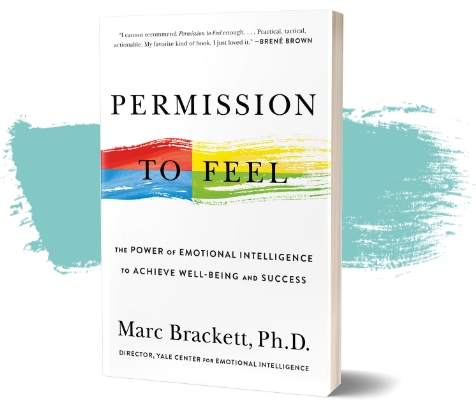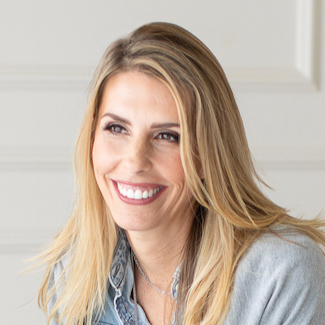How are you feeling? We all experience a wide range of emotions each day– joy, sadness, anger, anxiety, and everything in between. And what we do with these feelings can greatly impact our well-being, relationships and overall life satisfaction. I recently had the privilege and joy of chatting with Dr. Marc Brackett, author of the best-selling book Permission to Feel, Director of the Yale Center for Emotional Intelligence, and host of the webcast Dealing with Feelings, about the profound importance of emotional intelligence.
For the full interview, listen to our ‘Evolving with Gratitude’ podcast episode, embedded in this article (above) and also available on your favorite podcast platform.
No Such Thing as Bad Emotions
Marc addressed a common misconception that some emotions are seen as “negative” or “bad” while others are positive. As Marc shared, “I think it’s mostly because of the way it’s interpreted…the assumption is that positive emotions are the ones you want to grab and have all the time and negative ones, are the ones you want to dump and get rid of.” Marc argues that this is misguided, as anger can signal a legitimate grievance, sadness is a natural human response to loss, and overly positive emotions can actually impair decision-making. The goal isn’t to purge so-called “negative” feelings, but to understand and process the full range of our emotional experiences. Tools like the free How We Feel app that Marc co-developed with Ben Silbermann, co-founder of Pinterest and their respective teams aim to help build this emotional awareness and regulation.
“Anger, it’s a real feeling and certainly we’ve seen in our own society some very legitimate reasons for different groups of people to feel angry and to say that that’s a bad emotion just makes no sense because it’s a signal that there was an injustice that needs to be dealt with,” Marc explained.
Permission to Feel
In Marc’s book, Permission to Feel, he asserts that we all need spaces that allow for open emotional expression and guidance on managing feelings constructively. Marc advises that “We need feelings mentors. We need people who are deliberately in support of our healthy emotional development and who are making efforts to help us be more aware and helping us to learn strategies to deal with our feelings.”
His research shows that “people who report having had someone who gave them the permission to feel versus not having had someone, have different lives. They’re much more satisfied in their life, they have more purpose and meaning in their life, they have better mental health, better physical health, they sleep better at night.”
We need feelings mentors. We need people who are deliberately in support of our healthy emotional development and who are making efforts to help us be more aware and helping us to learn strategies to deal with our feelings.
—Marc Brackett
Misconceptions About The Field
One major misconception Marc addressed is that “the field of social and emotional learning, emotional intelligence is just trying to get people to talk about their feelings all the time…I’m the first person to say, I don’t want to talk about my feelings all the time, and nobody wants to listen to me talking about my feelings all the time. That would not be productive.”
Marc shares, “We’re going to have feelings throughout the day. We want to be aware of our feelings, want to know if our feelings are helping us or hurting us to achieve our goals. And then we want to have strategies to deal with our feelings.”
Another misconception is that social and emotional learning distracts from academics in schools. “It’s very, very clear now through multiple studies…that you teach these skills and not only do you get better physical and mental health and better relationships, but you do better academically in literature and math and other subject areas,” according to Brackett.
Emotional Intelligence in the Workplace
Marc emphasized that emotional intelligence skills are vital not just at home and school, but also in professional settings. “I’ve done some research, and I also have a company that does training and consulting for big companies, specifically emotional intelligence in the workforce. People are hungry for it.” He has seen how vital it is for leaders to model and create “emotionally intelligent environments” where employees feel supported in addressing difficulties constructively as a team.
Dealing with Feelings
Marc’s new webcast Dealing with Feelings explores practical, evidence-based strategies for regulating emotions effectively. As Marc explained, “I decided to do this project because I was getting really annoyed with what I was seeing– celebrities or influencers just saying stuff like, throw your anxiety out the door…it was all big personalities, kind of know-it-alls. And it really was offensive to me, as a neurotic introvert, who’s also a scientist.”
A few key techniques he and his guests on the webcast highlighted include social support, cognitive reframing, and breathing exercises. Guests sharing their personal stories and insights range from Grammy-nominated singer-songwriter Jewel to bestselling author and psychologist Dr. Angela Duckworth, among others.
Ultimately, Marc underscored that navigating emotions is an ongoing practice, not something solved once and for all. His work aims to demystify emotional intelligence through practical, evidence-based guidance.
4 Ways to Enhance Your Emotional Intelligence
Here are actionable ways to put Marc’s wisdom into practice:
- Embrace All Emotions: Recognize that all emotions, including those often labeled as negative, have value and importance.
- Seek or Offer Support as a Feelings Mentor: Find someone who can guide you through your emotional development, or be that guide for someone else.
- Cultivate Emotionally Intelligent Communities: Whether at home, school, or the workplace, foster environments that encourage open expression and constructive handling of emotions.
- Adopt Evidence-Based Emotional Regulation Strategies: Engage in scientifically validated methods like social support, cognitive reframing, and breathing exercises to manage emotions constructively, steering clear of unproven advice.
With compassion, and the right skills, we can navigate even the most turbulent emotional terrain. As Marc modeled, “We’re in this together. I’ve got you. I’m going to be here for you.”
If you’re ready to join me in giving ourselves “permission to feel,” check out Marc’s book, the webcast and the How We Feel app to improve vital emotional intelligence skills.
With gratitude,
Lainie
Connect with and learn from Marc Brackett
Website
Book
LinkedIn
Facebook
Instagram
X



